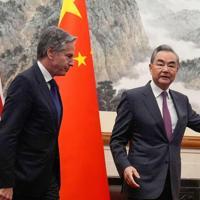


China‘s foreign minister on Friday urged visiting U.S. Secretary of State Antony Blinken to address rising disagreements or risk a “downward spiral” between the two powers after months of efforts to ease tensions.
Blinken, paying his second visit to the rival country in less than a year, voiced hope for progress but said he would directly raise areas of difference, which are expected to include Russia, Taiwan and trade.
China in turn has been infuriated by President Joe Biden’s pressure on the economic front — which is unlikely to ease during an election year — including a sweeping ban on semiconductor exports and efforts to wrest blockbuster video app TikTok away from its Chinese owners.
Foreign Minister Wang Yi received Blinken at the Diaoyutai state guesthouse in the capital’s ancient gardens before tables from the late Qing dynasty and an imposing painting of a Chinese mountain scene.
Wang told Blinken that relations between the world’s two largest economies were “beginning to stabilise”, especially after Biden and President Xi Jinping met in November near San Francisco.
“But at the same time, the negative factors in the relationship are still increasing and building,” Wang said.
Saying that China “advocated respect for each other’s core interests”, he demanded that the United States not “trample on China’s red line” on sovereignty, security and development.
“China’s legitimate development rights have been unreasonably suppressed and our core interests are facing challenges,” he said.
“Should China and the United States keep in the right direction of moving forward with stability, or return to a downward spiral?
“This is a major question before our two countries and tests our sincerity and ability.”
‘Very direct’
Despite the tough talk from Wang, U.S. officials and experts believe that Xi’s foremost priority is to manage headwinds in the Chinese economy and that, at least in the short term, he is looking to avoid flare-ups with the West.
Blinken’s aides previously said he would address a range of concerns including China’s support for Russia, which has rapidly rebuilt its military base two years into its invasion of Ukraine.
As he opened the meeting with Wang, Blinken said he would be “very clear, very direct”, but added, “I hope we make some progress on the issues our presidents agreed” on at the California summit.
He said the United States and China needed to show that they are “managing responsibly the most consequential relationship, I think, for both of us in the world”.
The two countries should be as “clear as possible about the areas where we have differences — at the very least to avoid misunderstandings, to avoid miscalculations”, Blinken said.
“That really is a shared responsibility that we have not only for our own people, but for people around the world, given the impact that our relationship has,” he said.
China has not confirmed a meeting between Blinken and Xi but the president saw him on his last visit in June, with that sit-down announced at the last minute.
Biden, who recently spoke by telephone with Xi, faces a tough re-election fight in November against his predecessor Donald Trump, who has cast China as an enemy and vowed a hard line.
The Biden administration has highlighted wins achieved by its diplomacy with China including what officials say is the first crackdown in years by Beijing on producers of precursor chemicals to fentanyl, the painkiller behind an addiction epidemic in the United States.
A State Department official said Blinken would ask China for more consistent law-enforcement action.
But while open to cooperation, Biden has increased pressure on China beyond Trump in some areas.
In the latest move, the U.S. Congress, with Biden’s support, voted to force the divestment of TikTok from Chinese company ByteDance or risk a ban in the United States.
U.S. officials allege security and privacy concerns over the app, which has taken off among U.S. teenagers.
ByteDance denies the allegations and has insisted it has no intention of selling.
U.S. officials say that Blinken will also seek calm from China ahead of next month’s inauguration of a new president in Taiwan — the self-governing democracy claimed by Beijing — and ask Beijing to use its leverage with Iran to encourage restraint in its increasingly open conflict with Israel.